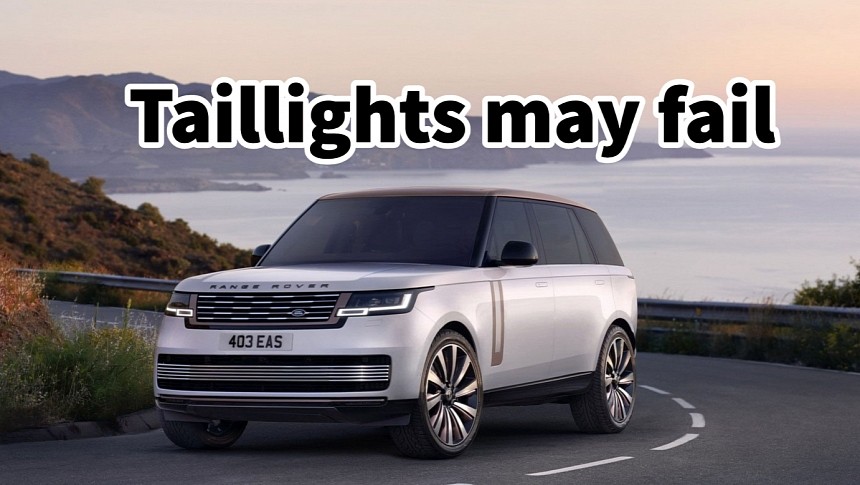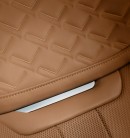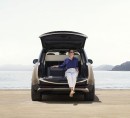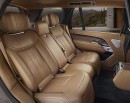Ever since Rover was calling the shots at Land Rover, the sport utility vehicle manufacturer's quality left much to be desired. The British automaker still isn't a paragon of quality as of June 2023, partly because Land Rover has a thing for weird engineering decisions or – put simply – bad design choices.
National Highway Traffic Safety Administration recall number 23V-394 perfectly encapsulates the aforementioned with the 2022 and 2023 model year Range Rover. The taillights are prone to fail – either partially or 100 percent – as a result of damage to the wiring caused by foam blocks located adjacent to the taillights. Care to guess which is Land Rover's remedy for this problem? Not surprising anyone, dealers nationwide will be instructed to remove the foam blocks in question.
If those foam blocks move as much as to damage the taillamp link lead wiring, there's no denying that someone didn't account for said movement during the development of the smartest and most luxurious Range Rover to date. Jaguar Land Rover started investigating this problem on March 9 in the wake of numerous field reports of taillight failures. The Product Safety and Compliance Committee within JLR tasked engineering with finding the root cause for said failures and the scope of this issue. So far, the British automaker is aware of no fewer than eight field reports in the United States market.
In addition to removing the foam blocks described earlier, dealers will also inspect the taillights and wiring. If either doesn't look good, both will be replaced at no cost to the customer. In the document attached below, Jaguar Land Rover North America didn't report how this condition was corrected in production at the Solihull plant in the United Kingdom.
An estimated 12,922 vehicles are called back, with production dates ranging between July 21, 2021, and November 29, 2022. This relatively random cut-off date may indicate a change in production that Jaguar Land Rover didn't make public. Dealers will be informed of recall number 23V-394 on June 15, with customers to be notified by first-class mail around July 28.
Recently spun off into a sub-brand as JLR transitions to all-electric vehicles, Range Rover has updated the… uhm… Range Rover for 2024 with more choices for customization, Dynamic Response Pro 48-volt active roll control, and a more powerful twin-turbo V8 of BMW origin. Exclusive to the well-appointed SV, this lump belts out 606 horsepower and the same 553 pound-feet (750 Nm) of torque as the 523-hp version.
Range Rover calls these mills P615 and P530, with P standing for petrol in British English and the numerical designations refer to metric horsepower. Lower down the spectrum, the full-size luxury sport utility vehicle can be had with inline-six engines featuring mild-hybrid or plug-in hybrid assistance.
Not long now, the palatial Range Rover and platform sibling Range Rover Sport will receive all-electric powertrains. The British company intends to roll out its first zero-emission vehicle sometime in 2024, most likely as a 2025 model year.
If those foam blocks move as much as to damage the taillamp link lead wiring, there's no denying that someone didn't account for said movement during the development of the smartest and most luxurious Range Rover to date. Jaguar Land Rover started investigating this problem on March 9 in the wake of numerous field reports of taillight failures. The Product Safety and Compliance Committee within JLR tasked engineering with finding the root cause for said failures and the scope of this issue. So far, the British automaker is aware of no fewer than eight field reports in the United States market.
In addition to removing the foam blocks described earlier, dealers will also inspect the taillights and wiring. If either doesn't look good, both will be replaced at no cost to the customer. In the document attached below, Jaguar Land Rover North America didn't report how this condition was corrected in production at the Solihull plant in the United Kingdom.
An estimated 12,922 vehicles are called back, with production dates ranging between July 21, 2021, and November 29, 2022. This relatively random cut-off date may indicate a change in production that Jaguar Land Rover didn't make public. Dealers will be informed of recall number 23V-394 on June 15, with customers to be notified by first-class mail around July 28.
Recently spun off into a sub-brand as JLR transitions to all-electric vehicles, Range Rover has updated the… uhm… Range Rover for 2024 with more choices for customization, Dynamic Response Pro 48-volt active roll control, and a more powerful twin-turbo V8 of BMW origin. Exclusive to the well-appointed SV, this lump belts out 606 horsepower and the same 553 pound-feet (750 Nm) of torque as the 523-hp version.
Range Rover calls these mills P615 and P530, with P standing for petrol in British English and the numerical designations refer to metric horsepower. Lower down the spectrum, the full-size luxury sport utility vehicle can be had with inline-six engines featuring mild-hybrid or plug-in hybrid assistance.
Not long now, the palatial Range Rover and platform sibling Range Rover Sport will receive all-electric powertrains. The British company intends to roll out its first zero-emission vehicle sometime in 2024, most likely as a 2025 model year.








































































